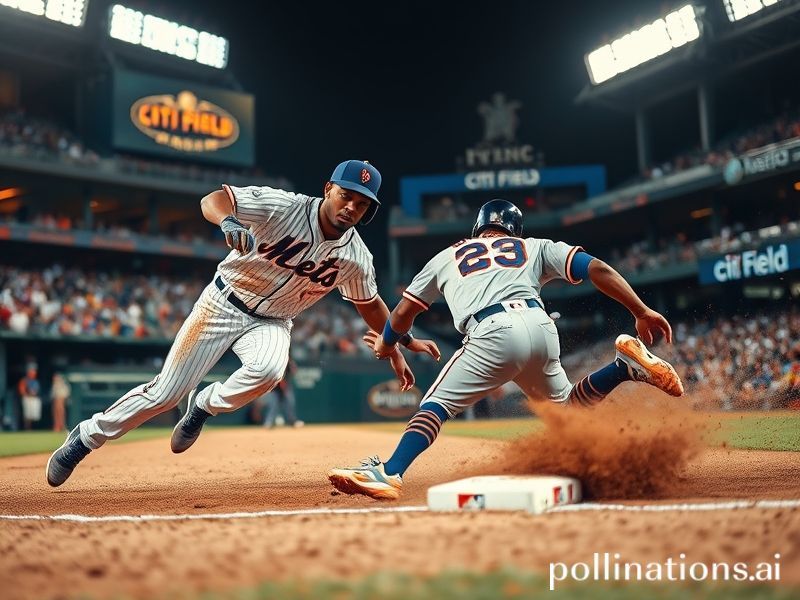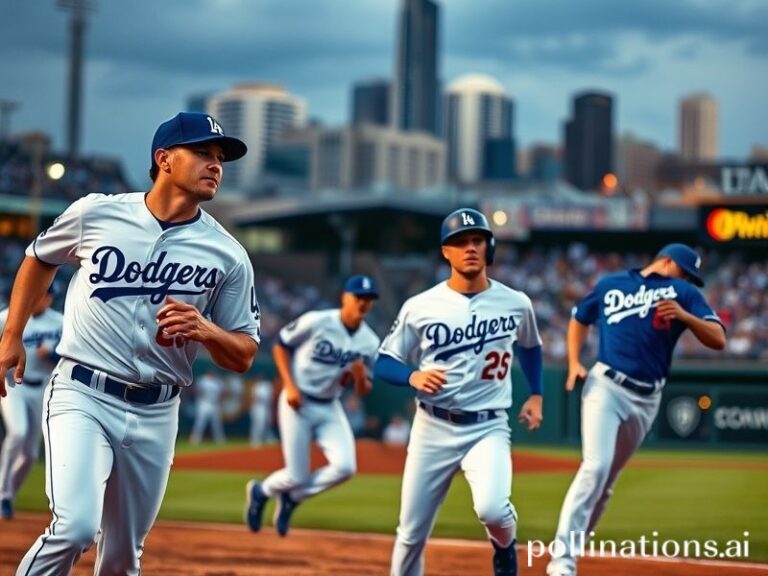Global Fracas in Flamingo Park: How Mets vs Marlins Became a Geopolitical Opera with Curveballs
Flamingo Park, Miami – The Mets and Marlins are at it again, a late-summer chess match played with sunflower seeds and shoulder fatigue. To the uninitiated it’s just baseball: nine innings, two dugouts, one slightly hungover organist. But zoom out a little and you’ll notice the game is actually a geopolitical micro-drama, complete with sanctions (pitch clocks), currency devaluation (the plummeting Venezuelan bolívar is still outperforming the Marlins’ attendance figures), and proxy wars (every reliever is basically a mercenary leased from Triple-A).
The Mets arrive like an aircraft carrier group: expensive, top-heavy, and one snapped UCL away from listing starboard. They are, in diplomatic terms, the United States of Payroll – $350 million in guaranteed contracts, give or take a Lindor. Their owner, Steve Cohen, could probably buy Greenland if he wanted the real estate, but tonight he’s settling for loanDepot park, a venue whose naming rights expire faster than Cuban visas. Across the diamond, the Marlins operate more like a midsize Pacific island nation: modest GDP, chronic trade imbalance (they keep exporting their best players for lottery tickets), and a flag that occasionally flutters in hurricane-force winds.
International implications? Start with the Dominican Republic, which has more citizens on the field tonight than the UN General Assembly has on a Friday. Julio Rodríguez might not be playing, but his cousins are – one on each side, because nothing says globalism quite like family reunions mediated by arbitration years. Over in the bullpen, a Japanese submarine-thrower warms up next to a Mexican curveball artisan and a Canadian whose fastball politely apologizes for existing. If the WTO ran a youth academy, it would look like this.
Then there’s the data. MLB’s Statcast system tracks exit velocity, spin rate, and, one assumes, the exact moment a fan’s will to live evaporates when the scoreboard reads 9-2, Marlins. That data is beamed to servers in Dublin, parsed by engineers in Seoul, and monetized by hedge funds in Greenwich that have never seen a batting cage but can arbitrage launch angles like wheat futures. When Pete Alonso launches a 115-mph missile into the Clevelander bar, some quant in Zurich is already shorting the citrus sector on the assumption that spilled margaritas depress lime demand.
Meanwhile, the betting lines in Macau shift faster than a Taiwanese semiconductor rumor. In-play wagers on whether the Mets’ bullpen will spontaneously combust are denominated in yuan, rupees, and whatever cryptocurrency Elon Musk tweeted about during the third inning. The British are here too, politely losing pounds on prop bets involving Starling Marte’s stolen-base probability, which, given Brexit paperwork, still clears customs quicker than a lorry at Dover.
But the darkest joke of all is hope. Every August, both fan bases convince themselves this series “matters.” Mets fans – a diaspora that stretches from Bay Ridge to Bahrain – cling to the illusion that October baseball is a birthright, not a statistical anomaly. Marlins fans, all six of them, whisper that 2003 could happen again, conveniently forgetting that 2003 also gave us the invasion of Iraq and the Motorola Razr. Hope, like a well-placed bunt against the shift, is charming until you realize the third baseman was playing in shallow right because he simply didn’t respect you.
By the final out – a routine grounder to short that somehow ricochets off a seagull and becomes a two-run error – the international scoreboard is clear: capitalism wins, pitchers lose, and the broadcast cuts to commercial showing a serene Swiss watch that will never know the heartbreak of a 3-2 slider that didn’t slide. The stadium empties into the humid Miami night, a place where every cab driver is a former outfielder and every outfielder is one bad slump away from driving that cab.
In the end, the Mets-Marlins series is less a contest than a mirror: a reminder that globalization, like a 162-game season, is mostly about enduring small humiliations in exotic locales while pretending the aggregate means something noble. The standings will reset tomorrow, the planet will keep spinning, and somewhere a kid in Lagos is learning to throw a splitter that will one day break another kid’s heart in Queens. Play ball.







